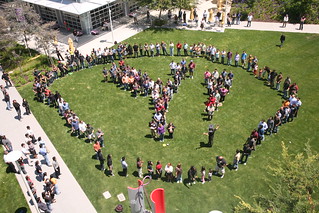IS MARISSA MAYER RIGHT TO CANCEL YAHOO! TELECOMMUTING?
/Marissa Mayer's decision to cancel work at home programs/telecommuting at Yahoo! has caused a flurry of critique (see links below). Rather than slam the decision as pushback on the value of increasing flexibility in organizations, I see this as an opportunity to Stop-Look-Listen and consider Yahoo!'s mix of needs. Marissa Mayer is not just running a company, she is rebuilding Yahoo! That rebuilding brings with it the complexities of extant people, tools, and organizational process that must be moved to support a new strategy. I don't have any inside information, but I do have some general thoughts for organizations as they think about workplace flexibility and how to lead by letting go.
Background: The Memo
(See this memo noting that by June all employees will be expected to work from Yahoo! offices - including those people hired into telecommuting jobs.)
To become the absolute best place to work, communication and collaboration will be important, so we need to be working side-by-side. That is why it is critical that we are all present in our offices. Some of the best decisions and insights come from hallway and cafeteria discussions, meeting new people, and impromptu team meetings. Speed and quality are often sacrificed when we work from home. We need to be one Yahoo!, and that starts with physically being together.
People
I agree that information transfers better when people are face to face. Professor Greg Northcraft and I have done research showing that at a basic level. That said, and to quote The Rolling Stones, "you can't always get what you want." There are trade offs to be made. The best person for the job may not be willing to work on site. That may be ok if the second best person is, but realize that the best person is now working for someone else.
Technology
I have no doubt that Yahoo! has access to superior technologies to enable collaboration and innovation whether on site or off. I am, however, often surprised that even tech savvy organizations haven't effectively integrated tools with practices. Tools make availability possible. Practices, however, are the stronger effect in terms of availability.
Organizational Practices
Nicholas Carson's Business Insider article includes confessions from Yahoo! employees that some may have been taking advantage of the opportunities to work offsite. His source notes that some employees were not productive in that mode, some jobs may have interdependence that would have been stressed by being away, and some may have been spending too much time focused on non-Yahoo! projects.
There is a lot to work with in that description. The across the board cancellation of work at home seems a bit like the current sequestration issues we're seeing in the U.S. - an inelegant solution to a complex problem.
Yahoo! is not alone in wanting people to work on site. Google and Pixar are also known for valuing people's presence. Other solid companies (Cisco, Accenture, Intel for example) are Fortune top companies but maintain effective telecommuting. This signals to me that there is no one right answer. The right decision for any company rests on its strategic goals and the mix of dimensions that it will use to align its overall design and management with those goals.
What's Right for Yahoo!?
If perception and speed of change are the biggest issues, then this action may be the fastest and most direct way to signal that Yahoo! is changing. The move, made from the top, with great pain to some, has grabbed attention inside and outside the company. Compliance will be easy to track, and as Nicholas Carson notes, there may be labor savings as some decide to work elsewhere.
Long term, I think it's a mistake.
I hope there will be a second phase, a second experiment, where teams are given the chance to lead themselves. Team and individual-based incentives for performance, not for presence, could be a big piece of this. As teams and individuals come to grips with the value and the costs of being on site, they may make changes in their work practices, their collaboration technologies, and maybe even who they hire, and whether those hires are contractors or full-time employees. These are all powerful inputs to work design and can be evaluated using evidence and insights that more available closer to where the work gets done, rather than in the C-suite.
Read More
- “Physically Together”: Here’s the Internal Yahoo No-Work-From-Home Memo for Remote Workers and Maybe More by Kara Swisher
- Yahoo! Has It Backward: Why Working from Home is Better for Everyone by Ellen Gallinsky
- Give People the Freedom of Where to Work by Richard Branson
And Still More (Added after original post, thank you Ayelete Baron & Others)
Yahoo kills Telecomutting. Three Cheers for Marissa Mayer! by Penelope Trunk
2025 Workplace: Intel Predicts the Future by Kevin Kruse
There's No Place Like Work by Robert Mankoff (via Roujin M.)
How Marissa Figured Out That Work at Home Yahoos Were Slacking Off by Nicholas Carson (via Drew R.) Happy to see this one as it does show there was data involved in the decision. I still stand by unilateral not being a good long term approach, but with data as a start, perhaps different approaches can be tried.
In Defense of Remote work (and Marissa Mayer) by Scott Berkun. Good in that this distributed work expert notes that unilateral not likely the best way. Good links to 100% distributed companies that are doing just fine.
Yahoo! Marches Resolutely into the 19th Century by Jack Nilles (father of telecommuting)








